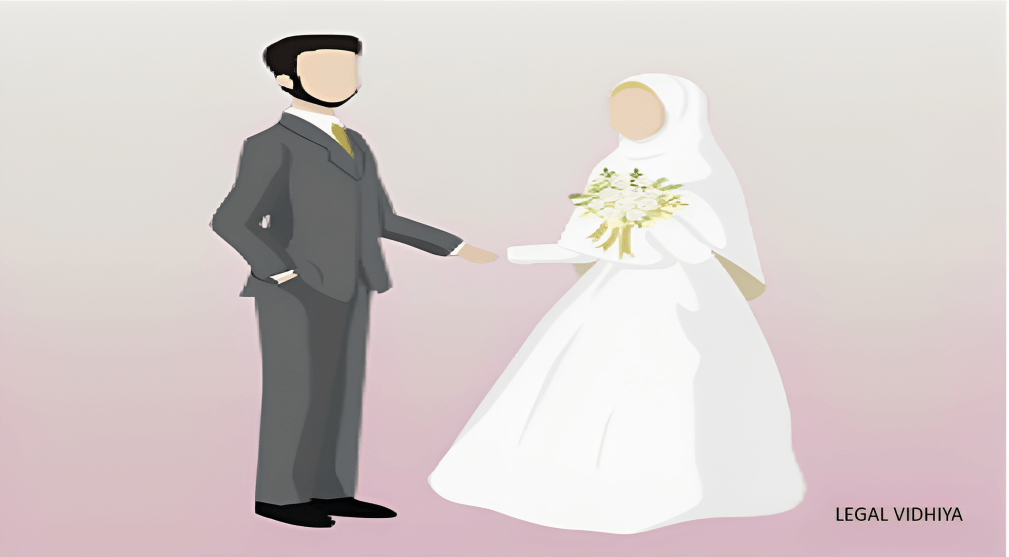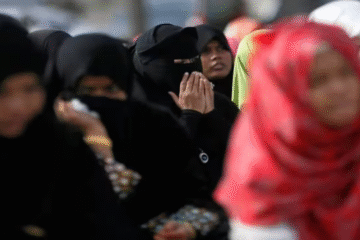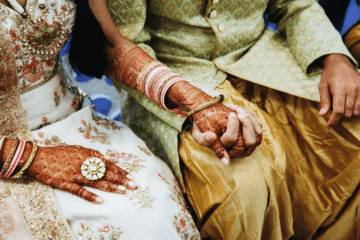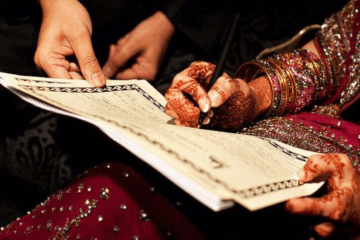
This article is written by Chhavi Tripathi of 3rd Semester of Atal Bihari Vajpayee School of Legal Studies, CSJM University, Kanpur, an intern under Legal Vidhiya
ABSTRACT
This article delves into the multifaceted world of Niakh, the sacred institution of Muslim marriage by addressing three fundamental aspects: Definition, objective and its inherent nature. It begins by providing a comprehensive definition of Nikah, encompassing its historical, theological, and contemporary dimensions. The article then delves into the diverse objectives that Nikah seeks to achieve, spanning the spiritual, social, moral, and personal spheres, thereby revealing the profound significance of this union within Islamic tradition. Lastly, it examines the nature of Nikah, exploring its rituals, the role of consent, and its unique status compared to civil marriage. By doing so, it illuminates the complex tapestry of Nikah, its role in Muslim societies, and its evolving character in the modern world. Readers are encouraged to explore this article for a deeper understanding of the multifaceted institution of Nikah in Muslim culture.
Keywords: Nikah, Objectives, Consent, rituals and Muslim culture, Muslim Society, Civil marriage, Muslim societies, Modern world, Multifaceted institution, Culture, Spiritual, Historical
INTRODUCTION
“One of His signs is that He created for you the spouses from among yourselves so that you may find comfort in them. And He has placed between your compassion and mercy.”[1] [Surat Ar-Rūm 30;21] – Quran’s beautiful words
Marriage is a union between two individuals and it is seen as the purest and oldest form of an institution. Different religions have different objectives of marriage. In Islam, Nikah is a sacred and significant institution of the Islamic faith. The nature is that of a contract that binds a man and a woman together in a lawful notion and holds profound importance in the lives of Muslims around the world. Mohammedan law or Muslim law is not codified like Hindu law and the problems related to age, consent, divorce, maintenance etc were dealt with by the various acts of the parliament.
The objective of nikah as mentioned in Islamic tradition is the establishment of a family. The marriage union under Islam is usually governed by Islamic principles which are deeply rooted in the teachings of the Quran and Hadith (sayings and actions of the prophet Muhammad, peace be upon him). In this article, we will explore the definition, nature, and object of Nikah to provide a comprehensive understanding of this essential aspect of Islamic culture and tradition.
II.DEFINITION OF MUSLIM MARRIAGE (NIKAH)
WHAT IS NIKAH?
The Arabic word ‘Nikah’ means the union of sexes and in law it means ‘marriage’. In Islam, Nikah is a contract between the two people. Both the groom and the bride must give consent to the marriage and their will to marry must be free. For a valid Islamic marriage, a formal, binding contract either verbal or on paper is considered integral[2].
The conception of Muslim marriage is closely related to the conception of contract as it requires some terms and conditions for a marriage like a valid contract”[3] Also the privy council stated in Shohrat Singh v. Jafri begum[4] that “Nikah is a religious ceremony under Muslim law” The objectives are therefore the promotion of family life and legalization of children.
In some marriages in Muslim cultures such as in Pakistani culture, there may be a delay between the Nikah and the actual enjoinment of the couple. This is called ‘Rukh sati’ in Desi culture— i.e., when the wife leaves her family’s home to move in with her husband, having been assured that her husband has attained a good job and home and has sustained her mahr.[5]
HISTORICAL PERSPECTIVE OF NIKAH
In pre-Islam Arabia, most of the laws were favourable towards men and discriminatory against women. Polygamy, which is the practice of having multiple spouses at the same time, was only allowed in specific situations and was not allowed when it came to marrying one’s biological mother or sister. In other words, in certain cases, having more than one spouse was permitted, but there were limits, and close blood relatives like one’s mother or sister were exceptions where it was not allowed. Women were denied their basic rights and were treated like chattels, and no inheritance was given to them, they were dependent upon the men who were considered superior to women. The question is who brought changes in the condition of women? The answer is Prophet Mohammad (Religious Leader), he completely uplifted the conditions of women and placed women on equal footing with men in the exercise of all the legal powers and functions[6].
ISLAMIC PERSPECTIVE OF NIKAH
The Islamic perspective views marriage as a social and legal relationship. Begins with the search for an appropriate partner and is solemnized with an agreement of marriage i.e., a contract.
Also, Muslim parents are not allowed to force their children to marry someone against their will as before marrying someone, Muslims seek the advice of Allah and Islamic teachings. The most significant part of Islamic marriage is the signing of the contract.
Islam places great importance on the role of the bride and the groom in marriage and emphasis is on the need for mutual respect, love and compassion. Like every other religion marriage Husband is seen as the head of the family, responsible for providing the necessities to the family. Muslim men are instructed to treat their wives with kindness which also means avoiding harshness and rudeness.
III. OBJECTIVES OF NIKAH
Quran and Hadith about marriage
The Quran and hadith (sayings and actions of the prophet Muhammad) teachings include:
- It highlights that peace, love, and compassion with one’s spouse are the essence of marriage.
- It has been mentioned that mutual respect and compassion are the purity of marriage also the wives should respect their husbands with love and mercy.[7]
- The Hadith states that one should treat the family of the other spouse with love and respect.
- The Hadith highlights that the relationship with Allah can be stronger when one shares faith and value with the other in a marriage.
SPIRITUAL ASPECT OF NIKAH
Nikah, often referred to as Islamic Marriage has several spiritual aspects that are integral to the ceremony and the institution of marriage in Islam. Like any other form of religious marriage, the purpose of marriage should be clear and in Islamic marriage, the understanding of Allah is essential as well as the rights and terms related to this institution. Here are some key spiritual aspects of Nikah:
- Procreation
One of the most important objectives of marriage is to continue and increase the population of Muslims. This goal could be achieved without marriage but these actions are a disobedience to Allah and they do not receive the blessing of Allah. The purpose is to produce righteous children who will be obedient to Allah, thus it is the means of Muslim parents to give their children the education they need so that they follow the right path.
2. Pleasure
Under Muslim marriage, Allah has mentioned that “The love of the desires for women, sons, … has been made attractive to people.” The message of Allah is clear that there is an attraction between the sexes and that is something natural and not something to be denied. Men are inclined towards women and vice versa. This desire between them is an urge which needs to be fulfilled.
3. Dua (Supplication)
During the nikah ceremony, the recitation of prayers and supplications is essential and these supplications seek blessings, guidance and protection from Allah for the couples as they embark on their marital journey.
4. Taqwa (God- Consciousness)
The nikah ceremony emphasises the importance of taqwa which means the consciousness of Allah in all aspects of life. It is a reminder for couples to maintain faith, morals and ethics in their marriage.
5. Mutual rights and obligations
Marriage is a union for life having mutually inclusive benefits and fulfilment for the contracting parties including companionship, emotional and sexual gratification, maintaining their property rights and maintaining contact with friends and family which are mutually beneficial for the family.
The spiritual aspect of Nikah is deeply rooted in the beliefs and principles of religion. It has emphasised the importance of intention, commitment, prayer and consent and the overall growth of the couples with the blessings of Allah.
IV. NATURE OF NIKAH
As discussed above marriage under Muslim law has similar characteristics as to a valid contract, regarding the nature of nikah there is a divergence of opinion. Some justices are of the view that Muslim marriage is purely a civil contract while others say it is a religious sacrament in nature.
MUSLIM MARRIAGE AS A CIVIL CONTRACT
JUSTICE MAHMOOD has observed that:“Marriage among Muhammedans is not a sacrament, but purely a civil contract, and it is solemnized generally with the recitation of certain verses from the Quran.” He also viewed that the dower (Mehr) and consideration should not be confused with each other.
Requirements for a Muslim Nikah
1. The parties i.e., the bride and the groom should be legally capable of marriage.
2. There must be the acceptance of marriage which is known as qubool and proposal (ijab).
3. Just as in a contract, entered into by a guardian on attaining majority so can a marriage contract be set aside by a minor upon attaining puberty.
3. The content of the parties should be free, like a valid contract without coercion, or fraud.
4. Consideration which is also known as Mehr in Islam should be there.
5. No Legislative hindrance should be there.
6. It is essential for a Muslim marriage that adequate witnesses must be present at the time
of marriage. it was held that a Muslim marriage is a contract, not a sacrament.
The Kerala High Court has observed in a case, “When a girl’s father has given the consent of marriage and the daughter has withheld her consent then there is no valid marriage.”[8] this case highlighted that just as a valid contract the consent is a must, same is for a valid marriage
In Yusuf v. Sowramma[9], it was held by J. V.R. Krishna Iyer that no religious significance or social solemnity is attached to Muslim marriage and it is merely a civil contract. This decision doesn’t put forward any definite argument and hasn’t gone through the principles of Shariah.[10]
MUSLIM MARRIAGE AS A RELIGIOUS SACRAMENT
Marriage in Muslim law is a civil contract but it has a religious significance too. Though the religious view of marriage is considered as an orthodox view. It views marriage as an Ibadat which means a devotional act. Also, the prophet has said that marriage is essential for every Muslim who can afford it. Further, he also says “There is no act of deification except marriage and faith, which has continued from the days of Adam and which will continue in paradise as well.”
Marriage under Muslim law cannot be considered a civil contract as both have differences between the two which are:
- Marriage cannot be made contingent on the future event.
- Marriage cannot be for a limited time.
- The wife is not allowed to divorce her husband to live with a third person if a part of a dower remains unpaid.
- Lastly taking into account the view of Justice Mitter that marriage among Muslims is nothing but a contract for the sale of goods. There are buyers and sellers in a contract of sale and the subject matter is goods; whereas, in a contract of marriage, the wife herself is to receive the dower and not her parents then who is the seller and what has been sold? If suppose that a woman is a seller and a woman’s personality is being sold then this is against the basic principles of natural justice.
Dr. Jung has observed that:
“Marriage is a spiritual act; its objects are rights of enjoyment and procreation of children The regulation of social life is important for the benefit of society.” Numerous judicial precepts have supported the religious nature of Muslim marriage. in the case of Anis Begum v. Mohammed Istafa[11], it has been laid down that Muslim marriage is both a civil contract as well as a religious sacrament.
V. CLASSIFICATION OF MUSLIM MARRIAGE
There are two groups of Muslims: Sunni Muslims and Shia Muslims, marriage in both sects is performed differently under different rites and customs all over the world. Further as previously stated marriages are social contracts that are binding on the parties.
The classification of marriage could be done under Muslim laws as:
- Valid Marriage (Sahih Nikah)
- Void Marriage (Batil Nikah)
- Irregular Marriage (Fasid Nikah)
- Muta Marriage
- VALID MARRIAGE (SAHIH NIKAH)
As discussed above there are some requirements for a legal marriage that have to be fulfilled, we will escort ahead with the capacity to marry as follows:
i. Every Mohammedan who is of sound mind and has reached puberty which is 15 years when there is no proof of marriage is eligible to marry.
ii. By way of guardians who are minor and insane may be validly married.
iii. As in any valid contract, the consent of both parties is required, if not then the marriage will be declared null and void.
The word ‘Sahih’ is an Urdu word that means ‘right or true’ and ‘Nikah’ means marriage. this marriage usually takes place when all the conditions of the marriage are satisfied. It means when a Muslim man and a Muslim Woman enter into an arrangement by way of offer and acceptance that marriage is legitimate provided the groom has paid the Bride’s Mehr. The following are the characteristics of a Valid Marriage:
i. The legally married parties are allowed to consummate their union.
ii. The parties gain inheritance rights.
iii. The wife is not entitled to maintenance in the event of divorce because it is assumed that the dower which is paid at the time of marriage is adequate for the well-being of the wife.
iv. Husband and wife must be respectful and obedient to one another.
v. The children born from a legitimate marriage are considered legitimate children.
vi. A woman must perform the iddat when she is divorced or is a widow. The period of iddat is usually 90 days has passed after the husband’s death.
EFFECTS OF VALID MARRIAGE
The following are the effects of a legitimate marriage:
i. The cohabitation of husband and wife is recognized as legal.
ii. Children who are born from a legal marriage are legitimate and have the right to inherit their parent’s assets.
iii. There are mutual inheritance rights for husband and wife which means after the death of the husband the wife can inherit the property and after the death of the wife the husband can inherit the property.
iv. A prohibited marriage relationship is established between the husband and wife, each of them is prohibited from marrying the other’s relations under the prohibited degrees.
v. A woman’s legal status is unaffected by marriage i.e., her personality is distinct from her husband’s. if a Shia Woman marries a Sunni, she retains her Sunni status and is only subject to Shia law after marriage.
2. VOID MARRIAGE (BATIL NIKAH)
An agreement that is not legally enforceable by law is invalid according to the Indian Contract Act 1872. A void marriage is one in which a prospective bride and groom do not fulfil any requirements of Muslim marriage, and any marriage that occurs in furtherance is referred to as a void marriage:
In a case, it was held by the court, that “an invalid marriage is the one in which there is a permanent or lifelong ban from marrying due to non-compliance with a condition.”[12] Following are the instances when a Muslim marriage is null and void:
i. When both spouses are incapable of cohabiting
ii. When a married man marries another’s wife.
iii. Marriage with a Non-Muslim.
iv. When a man marries four women but marries a fifth woman then that fifth marriage is null and void.
The following are the ramifications of a void marriage:
i. The marriage is void ab initio from the very first day of marriage, even though it is consummated
ii. A void marriage does not give the parties any civil rights or bind them to any legal obligations.
iii. If the marriage is found to be invalid then the right to obtain maintenance after divorce is lost.
iv. When a child is born out of a void marriage then that child is illegitimate.
v. There is no need to receive a divorce decree in case of void marriages.
3. IRREGULAR MARRIAGE (FASID NIKAH)
An irregular marriage refers to a marriage where there is a lack of formality or the presence of an impediment that can be overcome. Generally, the marriage is not illegal in itself and as soon as the irregularity is removed the marriage is legitimate.
An irregular marriage only occurs among Sunni Muslims, while an irregular marriage is a void marriage under Shia Law. This type of marriage is generally voidable and if any irregularity is removed from the illegitimate marriage, then that becomes legitimate and valid.
In the case of Ata Mohammed v. Saiqul Bibi[13], it was held that when a marriage is temporarily forbidden but not necessarily limited, it is not invalid. The following are the ramifications:
i. Once the marriage is consummated, the wife has no right to dower from the husband if he divorces her.
ii. The wife is not bound by the Iddat law, which prohibits remarriage within three months of divorce if the marriage has not been consummated.
iii. During the three-month iddat period, the wife has no right to maintenance from the husband.
iv. If the irregular marriage is consummated and children are born, the children will be considered legitimate and will be entitled to all inheritance rights.
4. MUTA MARRIAGE
Muta marriage is a unique type of Muslim marriage, mainly practised among Shia Muslims and not among Sunni Muslims. To understand this concept better, it’s essential to delve into its historical context. Shia Islam is prevalent in various Arabian countries, including Abu Dhabi, and is often associated with the Sheikhs, who were involved in the oil industry, mining, processing, and export. Due to business obligations, these Sheikhs frequently had to travel to distant locations and stay there for extended periods. During their time away from home, they still had their natural human desires, but Islamic principles prohibited them from engaging in physical relationships with anyone other than their wives.
This is where “Mutual marriage” comes into play. Muta, which translates to “pleasure marriage,” represents a temporary agreement between two individuals for a specified duration. The duration of such a marriage is flexible, with no strict minimum or maximum limit. It could last for a day, a month, or even a year. When the agreed-upon period elapses, the marriage naturally comes to an end. However, if there was no specific timeframe stipulated, it’s assumed to be a permanent marriage. It’s important to note that Sunni Muslims generally view Muta marriage as a form of prostitution and do not endorse it.
In practice, Sheikhs used to enter into Muta marriages with women while they were in town, subsequently divorcing them and providing dower as compensation when they departed. Within the Shia sect, this form of marriage found acceptance and recognition under Muslim personal law, commonly known as Muta marriage.[14]
CONCLUSION
The system of Islamic marriage is sacred and profound and holds immense Islamic significance in culture and society. As discussed already its definition goes beyond a mere legal contract rather it represents a spiritual bond that is based on love, trust and mutual respect. The objective of nikah is to establish a family unit that is in adherence to the Islamic principles, companionship, harmony and faith. Its nature is rooted in the teachings of the Quran and the Sunnah, emphasizing equality and consent and upholding the rights and responsibilities of both spouses.
Nikah encapsulates the beauty of the Islamic tradition, where the commitment to marriage is celebrated as a cornerstone of a strong, enduring community. Understanding the definition, nature and objectives of Nikah is not only crucial for Muslims but also for those seeking to appreciate the diversity and depth of this culture worldwide.
REFERENCES
- Islam awakened, https://www.islamawakened.com/quran/30/21/ (Last Visited on October 23, 2023)
- Wikipedia, https://en.wikipedia.org/wiki/Marriage_in_Islam (last visited on 16 October 2023)
- Wikipedia, https://en.wikipedia.org/wiki/Marriage_in_Islam (last visited on October 16, 2023)
- Scribd.com, https://www.scribd.com/document/435390039/Muslim-Family-Law (Last Visited on October 22, 2023)
- Medium, https://mustansarjavaid.medium.com/islamic-perspective-institution-of-marriage-3549bd6d0ee4 (last visited on October 16, 2023)
- Lawctopus, https://www.lawctopus.com/academike/marriage-under-muslim-law/ (Last Visited on October 23, 2023)
- Lawyersclubindia, https://www.lawyersclubindia.com/articles/marriage-under-muslim-law-13977.asp (Last Visited on October 23, 2023
[1] Islam awakened, https://www.islamawakened.com/quran/30/21/ (Last Visited on October 23, 2023)
[2] Wikipedia, https://en.wikipedia.org/wiki/Marriage_in_Islam (last visited on 16 October 2023)
[3] Abdul Kadir v. Salima and Anr., (1886) ILR 8 ALL 149
[4] (1915) 17 BOMLR 13
[5] Wikipedia, https://en.wikipedia.org/wiki/Marriage_in_Islam (last visited on October 16, 2023)
[6] Scribd.com, https://www.scribd.com/document/435390039/Muslim-Family-Law (Last Visited on October 22, 2023)
[7] Medium, https://mustansarjavaid.medium.com/islamic-perspective-institution-of-marriage-3549bd6d0ee4 (last visited on October 16, 2023)
[8] 1991 DMC 214
[9] AIR 1971 Ker 261
[10] Lawctopus, https://www.lawctopus.com/academike/marriage-under-muslim-law/ (Last Visited on October 23, 2023)
[11] AIR (1933) ALL 634
[12] Lawyersclubindia, https://www.lawyersclubindia.com/articles/marriage-under-muslim-law-13977.asp (Last Visited on October 23, 2023)
[13] 1910
[14] Lawyersclubindia, https://www.lawyersclubindia.com/articles/marriage-under-muslim-law-13977.asp (Last visited on October 23, 2023)




0 Comments